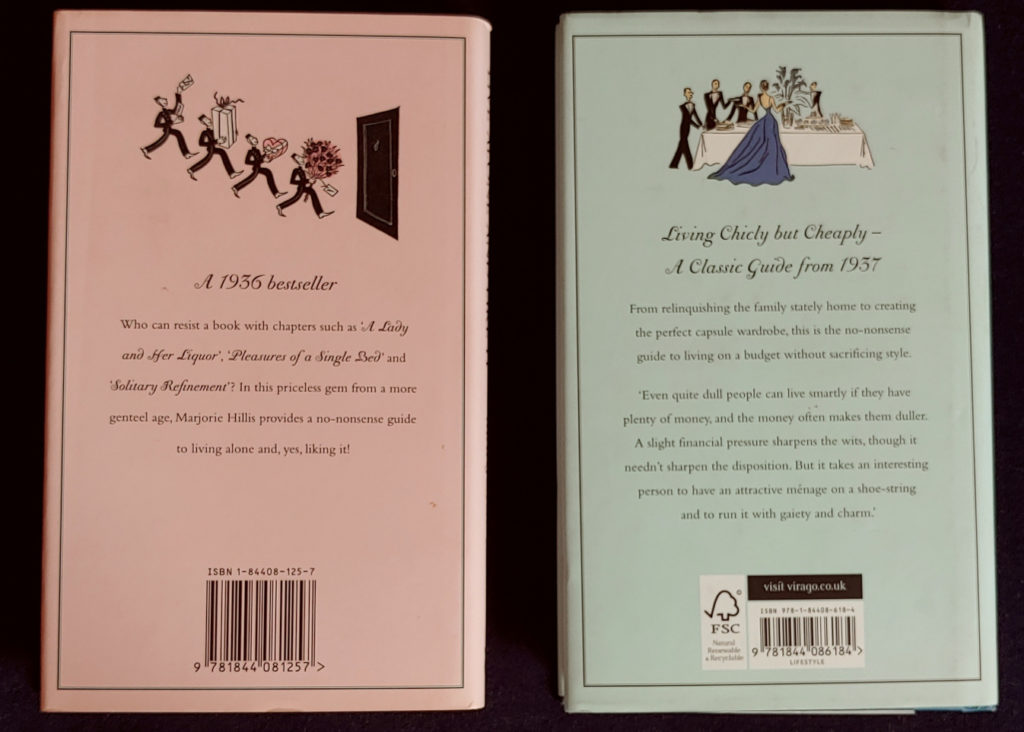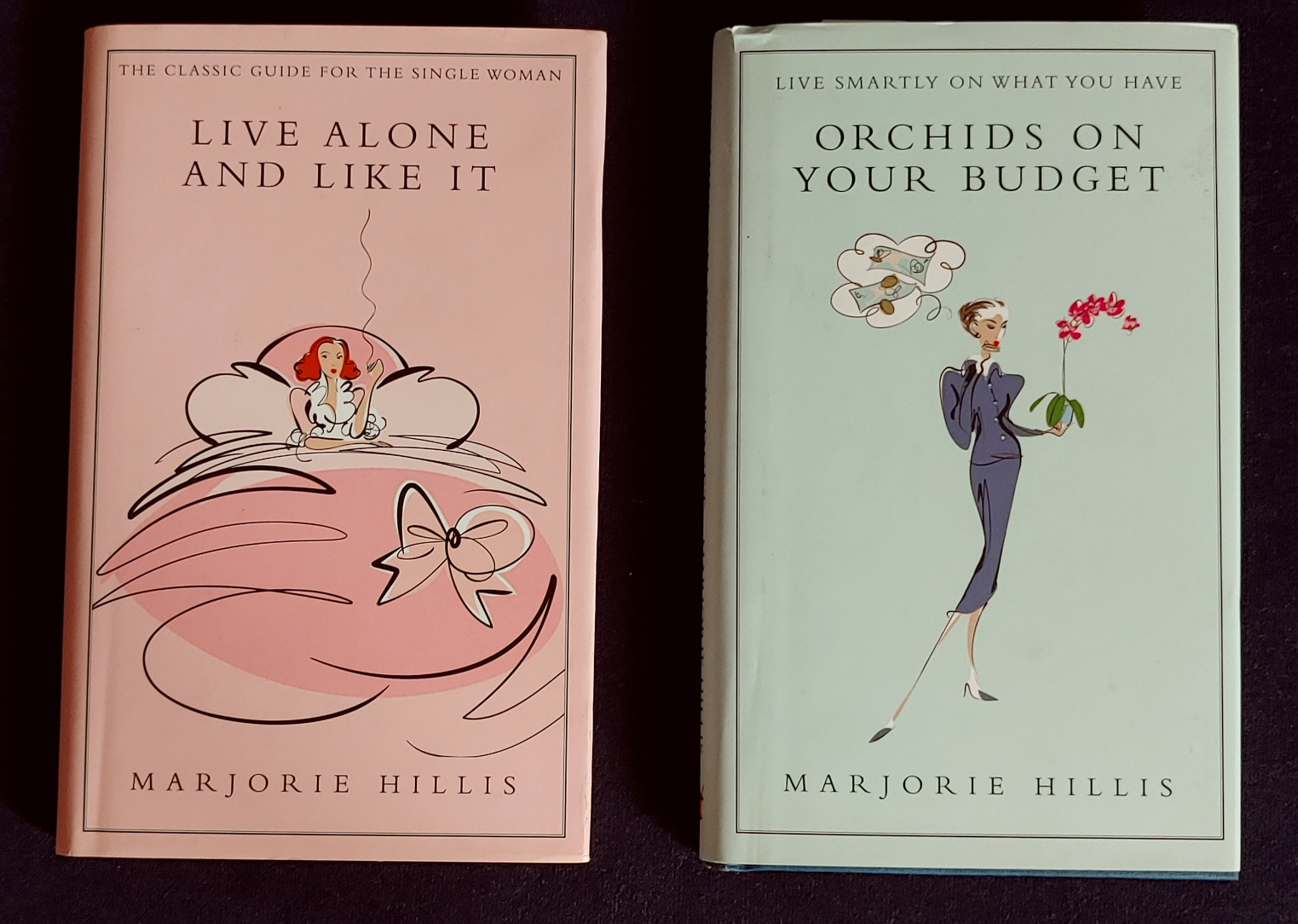These two book gems are the pendant to a 1930s screwball comedy with Carole Lombard or Katherine Hepburn, with sparkling wit and full of tongue-in-cheek advice. The books are written by Marjorie Hillis, a “Vogue” editor in New York, then nearing 50 years of age.
There is nothing dusty about these books, and nothing outdated. They are as true as they were 90 years ago. They are positive, they are smart, and they are full of life.
Marjorie Hillis was born in Illinois, the daughter of an active clergymen and philosopher. Her father’s Wikipedia entry is longer than hers. Her mother also published a book “The American woman and her home”. The family seems to have been doing fine financially and for sure the daughter’s intellect was stimulated by her parents. They moved to New York when Margaret Louise (Marjorie) Hillis was only 10 years old. She attended a private boarding school that also had famous poet Dorothy Parker as a student. Afterwards she went a year abroad and then started to work as a writer for “Vogue”. She married with 50 years of age for the first and only time and her husband died after only 10 years. Marjorie Hillis lived to the sensible age of over 80. As her two books became such bestseller’s, it is astonishing there is not much more known about her personal life.
If she had many boyfriends or how long she lived on her own, I do not know. She must have liked living alone or at least mastered it very well, because her first book makes one want to leave one’s husband to try it out.
We can assume she had a good standard of living, at least from the mid-30s onwards. How much might she have been hit financially by the Great Depression of 1929? Enough maybe to remember how it was to save money and to live on a budget, because that’s what she wrote masterly about in her second book. Both books are wonderfully illustrated, by Winifred Mury and Cipe Pinelles, as you can see from the front and back covers. If we master the elegance shown in the drawings, we will never be lost.

The bigger bestseller is “Live alone and like it”, I learned more from “Orchids on your budget”.
Marjorie Hillis explains that all is about attitude. If you are a whiner, you will always find reasons for self-pity and you will make sure that people run away from you. No big family of friends for complete bores who have nothing to offer but bad habits and worse temper. There is no excuse for sloppiness. This crystal-clear posture of ‘if you fall down, get up again, make sure your little crown is placed neatly on your head, and move on’ is very similar to her contemporary Diana Vreeland, who worked at rival magazine Harper’s Bazaar from the end 1930s onward.
There is a clear logic to feel happy when living alone. A circle of friends (and enemies, as she wisely adds) does not come from nothing. No party will happen in your apartment, if you don’t plan it and if you don’t invite the guests, and of course no companionship with people will happen, if you complain the whole time or wait for others to attend to you.
One of the best sentences in the book is the one I quote here: “the more you enjoy yourself, the more of a person you are”.
A woman should have interests, hobbies and a general positive attitude to life. No one o can expect others to feel it their duty to make us happy. And by the way, no one can make anyone else happy, you can only do it yourself. Happiness and contentment are a state of mind.
Nice clothes and accessories one can buy, and one should. It has to do with self-esteem.
Being a perfectly normal woman without fame or money is not a disadvantage at all in finding friends. Celebrities have many people around them who only want to use them or bask in their glory. They sleep alone as often as the next woman. Let us be happy for the privacy we have instead.
Marjorie Hillis tells some really witty stories about how you can try to seem more than you are in terms of money and friends. Whilst those tricks might need a little bit of adaption for today, they show her mischievous spirit and humour.
Now let’s have a look on “Orchids on your budget”, the self help book on how to survive with the money you earn. She starts with common sense – there could always be more money, so basically everybody needs to budget. Not taking care of your appearance or let go of yourself is the greatest sin. She summarizes that, e.g. for a good wardrobe one needs either money, or time, or taste, no need of all three. Going from a “what shall I do”-attitude to a “what can I do”-attitude is the big leap forward. There are always ways of getting things done. It’s important not to wait till things have deteriorated too far. Keeping good care of yourself is a sign of being sensible.
I like her testing questions to find out if you are stingy or thrifty. They are to the point and I must confess I found myself cringing by some of her explanations. I indeed do hope friends drive me home after a common event, and try to push them into that direction. So that that makes me a sponger. Kind of true, as it my decision not to own a car and a taxi ride is cheap in comparison…
Marjorie Hillis has a lot to say about how to make a budget and where rent should be in relation to total income. Rent has been and is today the biggest factor in almost anyone’s budget. Her advice is to stick to between 20-30 percent of the monthly available budget. What was the truth 90 years ago has not changed. Houses are where people most seriously overspend and they can bring you down hard. It is very, very important to live in a nice home. It gives you so much back, even more so today when working from home is the rule. Your home should not bring you headaches, that’s why you should accept your budgets limits.
Marjorie Hillis is tougher than us here in Europe when it comes to what the world or the state owes you, and I’d like to quote her, as it is worth to remember: “One of the first danger signals is the well-known feeling that the world owes you a living. It doesn’t; you owe it something worth paying for”. You can find the quote in chapter 10 ‘When you are really broke’.
So where do us the two books leave? On the one hand they are a very good read, full of clever and smart advice from a woman who was no fool and has seen a lot. On the other hand, they should make us think. We have been spoilt and become dependent on many things here in Europe, more so than the USA. The USA is harder on every individual to take more responsibility for their fate. One can see that in times of crisis or depression. People in the USA seem to complain less, they know no one wants to hear it. In Europe now a war is raging, very close by. Things might change to the worse, as they have for people in Ukraine from one moment to the next.
If we are grateful for what we have and stay flexible and don’t expect too much from others, be it on a personal level or money wise, we are well equipped to make our life a success. Sounds pretty simple? Try living it.
All rights to the books belong to:
Hillis, Marjorie: Live alone and like it, The classic guide for the single woman, published by the Bobbs-Merrill Company in 1936, USA. Foreword by Lisa Hilton, published in Great Britain by Virago Press in 2005, ISBN: 1-84408-125-7
Hillis, Marjorie: Orchids on your Budget, Live smartly on what you have, published by the Bobbs-Merrill Company in 1937, USA. This edition published in Great Britain by Virago Press in 2009, ISBN: 978-1-84408-618-4

